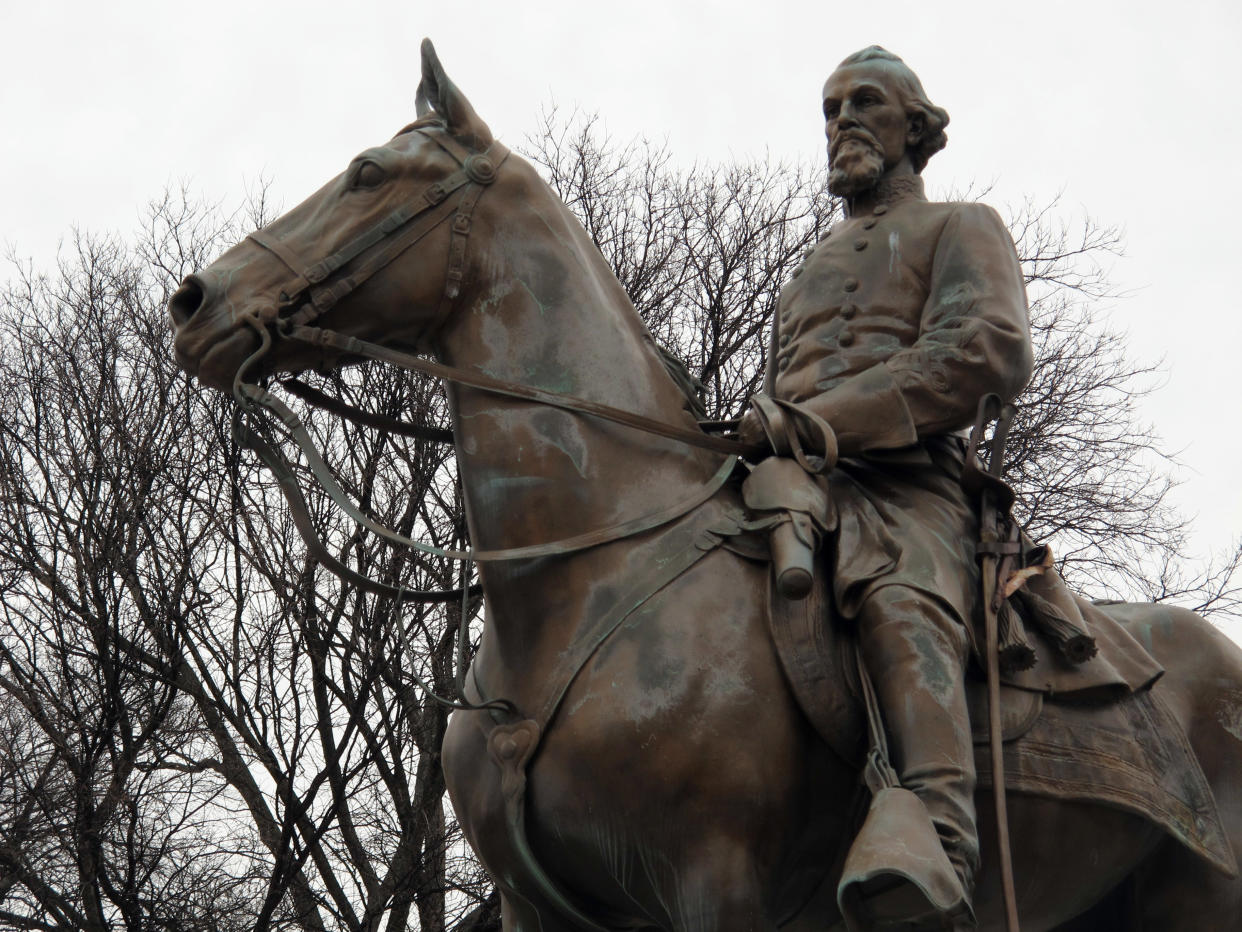State hits Memphis for removing Confederate monuments
Months after the city of Memphis circumvented state law to take down two statues honoring the Confederacy, Tennessee’s Republican-led legislature is punishing the city by stripping funding for its planned bicentennial celebration.
The Tennessee House voted Tuesday to remove $250,000 that had been earmarked for festivities to commemorate the city’s founding in 1819. Legislators who supported the moved explicitly linked it to the removal of the Confederate monuments, which took place after dark, with no official announcement, on Dec. 20.
“What this amendment does is it removes $250,000 from the budget that is designated to go to the city of Memphis for their bicentennial celebration,” said state Rep. Steve McDaniel, a Republican who sponsored the bill, on the House floor. “If you recall, back in December, Memphis did something that removed historical markers in the city. It was the city of Memphis that did this, and it was full knowing it was not the will of the legislature.”
“Today is a demonstration that bad actions have bad consequences, and my only regret about this is it’s not in the tune of millions of dollars,” added GOP Rep. Andy Holt. He compared Memphis’s move to ISIS’s attempts to “erase history” and said cities shouldn’t be allowed to skirt state laws if they don’t like them.
The alleged “bad actions” by the Memphis mayor and city council used some creative legal maneuvers to get around a 2013 state law, the Tennessee Heritage Protection Act, which required local governments to get approval from the state historical commission to remove statues from public property. Unable to get permission to take down monuments to Confederate Gen. Nathaniel Bedford Forrest and Confederate President Jefferson Davis, the city sold the land on which the statues stood to a nonprofit, which then took the statues down.
While the Memphis nonprofit moved the statues to an undisclosed location with the intent of transferring them to a historical society or Confederate memorial site, Holt said he stuck by the reference to the Islamic State as he felt both groups were trying to “eliminate” history.
“My comparison to ISIS is not to say that these folks are terrorists or extremists or whatever else,” said Holt in an interview with Yahoo News, “it’s simply to say the removal of historical documents, the removal of historical markers is characteristic of what ISIS has done.”

“It’s racist, it’s vindictive, it’s mean-spirited, it’s embarrassing,” said Rep. Antonio Parkinson, a Democrat who represents Memphis, of the amendment. Parkinson was booed on the floor Tuesday for calling the amendment racist, an action he told Yahoo News he considers to be a “badge of honor.”
The vote wasn’t the first attempt by the state legislature to punish Memphis for its actions. Earlier this year a bill was proposed that would have made it a felony for local officials to vote to remove statues using the same legal maneuver. Last month the Republican supermajority recalled a resolution that had honored Tami Sawyer, the leading activist for the anti-Confederate statue movement. There have also been attempts to strengthen the Protection Act and to make it legal for the state to take possession of monuments “in jeopardy of loss, destruction or exploitation.”
The main target in Memphis was the century-old Forrest statue overlooking one of the city’s main thoroughfares. Forrest was a swashbuckling Confederate cavalryman who became a Southern icon — the namesake of the fictional Forrest Gump — but a statue honoring him was deemed offensive by Memphis, whose population is mostly African-American. Before the Civil War Forrest was a slave trader, running the Negro Mart downtown. During it he was questioned for war crimes after troops under his command allegedly massacred black Union troops who were attempting to surrender at Fort Pillow. After the war, he was the first grand wizard of the Ku Klux Klan.
“I never understood as a kid growing up these are public parks yet they display a monument of someone that was brutal to my ancestors,” said City Council Chairman Berlin Boyd. “He sold them, and he was not the type of image or man we should be portraying, especially in a city like Memphis that is predominantly African-American.”
The Forrest statue was dedicated in 1905 at the height of Jim Crow, while the monument to Davis that was also removed in December went up in 1964, as part of the backlash to the Civil Rights movement. (The parks where the statues stood were themselves segregated until a Supreme Court ruling in 1963.) Opposition to the statues gathered momentum after white supremacists held a violent rally in Charlottesville, Va., last September to protest the removal of a statue of Robert E. Lee. The local Chamber of Commerce and over 150 religious leaders backed the movement. The city was determined to act before the ceremonies earlier this month commemorating the assassination of Martin Luther King Jr. in Memphis 50 years ago. The city council vote to sell the parks and bring the statues down was unanimous.

The city has other options for funding its bicentennial celebration, including a direct appeal to Tennessee Gov. Bill Haslam, a Republican leaving office after this year. Rep. Raumesh Akbari, a Democrat who represents Memphis, told Yahoo News that she had also received multiple suggestions to start a GoFundMe page, an action that the Commercial Appeal reports has already been taken by another Memphian.
“While we would have appreciated the additional funding,” wrote Memphis Mayor Jim Strickland on Twitter, “the ongoing planning for the joint city-county bicentennial will continue unchanged.”
McDaniel did not respond to a request for interview, nor did Rep. Matthew Hill, who introduced the bill. Hill represents Jonesborough, Tenn., which is a seven-hour drive from Memphis.
“The Civil War ended in April of 1865,” said Rep. Bo Mitchell, a Democrat who represents Nashville and opposed the amendment. “Get over it.”
Read more from Yahoo News:

